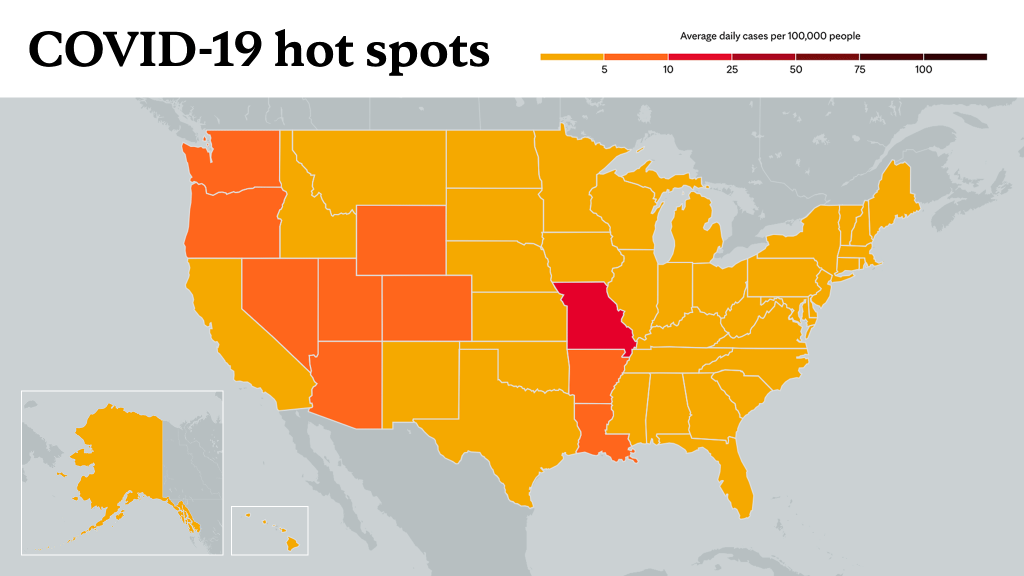
The July Fourth holiday is a time when many people travel or host summer parties. While the number of COVID-19 cases in the U.S. is on the decline, health experts say with stagnating vaccination rates and the circulation of the more contagious Delta variant, the nation is not out of the woods yet, and everyone should still be cautious if they're planning a trip or getting together in large groups.
"Anyone planning to have a gathering for the Fourth of July who is eligible for vaccination, they should get vaccinated. That would be the No. 1 piece of advice. For those who are too young to be vaccinated, I think keeping your celebrations outdoors is a way to reduce the risk," says Dr. Nipunie Rajapakse, a Mayo Clinic pediatric infectious diseases physician.
Watch: Dr. Nipunie Rajapakse talks about holiday travel during COVID-19
Journalists: Sound bites with Dr. Nipunie Rajapakse are in the downloads at the end of the post. Please courtesy: "Nipunie Rajapakse, M.D. / Pediatric Infectious Diseases/ Mayo Clinic."
Children under 12 not yet eligible for COVID-19 vaccination
"I think, obviously, children missed out on a lot of activities that they generally really enjoy doing, especially in the summer months last year. And, so, we know many families are planning to move around a bit more, especially now that the parents are vaccinated. And I think there are certain things families can think about when they're planning what they're doing this summer ― certain safer options, including considering outdoor activities. We know that the virus does not spread well outdoors. And activities like camping or hiking, for example, with children who are unvaccinated might be a nice option for the summer ― both for exercise and to get outdoors," says Dr. Rajapakse.
Reduce COVID-19 risk at gatherings
"If you have high-risk individuals, especially high-risk unvaccinated children, for example, and you're planning a gathering of many people, then that might be a scenario where you may want to recommend masking and other precautions take place," says Dr. Rajapakse. "I would in the same vein discourage very large gatherings of people if there's going to be unvaccinated children around, even if it's happening outdoors as well. And paying some attention to the size of the crowd, the amount of space you have activities like eating, where you might have a sharing of utensils or food, are all things to carefully think through to figure out ways that you can reduce the risk."
People at high risk of COVID-19 complications
"Especially with a group that may be higher risk for developing complications if they were to get COVID-19 infection, I would be extremely cautious about mixing children from different households who are unvaccinated, even if all of the adults are vaccinated. Certainly, there are things you can do to reduce risk in that situation. But I think it would be difficult with any gathering of people to completely eliminate risk when you have multiple unvaccinated people from different households. And, certainly, we would think very carefully about that. But masking, distancing, hosting a gathering outdoors would be strategies that you could use to reduce risk," says Dr. Rajapakse.
International travel
"Many different countries have set out different expectations for what kinds of vaccine documentation you need, what kinds of testing you need. And, so, I think it's important to make sure you're very familiar with any recommendations, guidelines related to where you're planning to go, and very importantly understanding what is going on with COVID-19 in those countries. We definitely recommend against traveling, especially with unvaccinated children, to any area that's seeing a lot of viral transmission or large outbreaks ongoing," says Dr. Rajapakse.
She adds that anyone with questions about travel, gatherings and COVID-19 should start by talking to their health care provider. And keep up to date with the latest recommendations from the Centers for Disease Control and Prevention.
_______________________________________________
Information in this post was accurate at the time of its posting. Due to the fluid nature of the COVID-19 pandemic, scientific understanding, along with guidelines and recommendations, may have changed since the original publication date.
For the safety of our patients, staff and visitors, Mayo Clinic has strict masking policies in place. Anyone shown without a mask was either recorded prior to COVID-19 or recorded in a nonpatient care area where social distancing and other safety protocols were followed.
For more information and all your COVID-19 coverage, go to the Mayo Clinic News Network and mayoclinic.org.
Learn more about: Tracking COVID-19 and COVID-19 trends.








